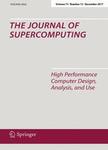版权所有:内蒙古大学图书馆 技术提供:维普资讯• 智图
内蒙古自治区呼和浩特市赛罕区大学西街235号 邮编: 010021

作者机构:Department of Computer Engineering Sari Branch Islamic Azad University Sari Iran Future Technology Research Center National Yunlin University of Science and Technology Yunlin Taiwan
出 版 物:《Journal of Supercomputing》 (J Supercomput)
年 卷 期:2023年第79卷第2期
页 面:1451-1503页
核心收录:
学科分类:0711[理学-系统科学] 1202[管理学-工商管理] 1201[管理学-管理科学与工程(可授管理学、工学学位)] 08[工学] 0835[工学-软件工程] 0701[理学-数学] 0812[工学-计算机科学与技术(可授工学、理学学位)]
主 题:Scheduling
摘 要:Heterogeneous cloud datacenters are well-suited and cost-efficient platforms for execution of scientific workflows requested from academics. Workflow scheduling algorithms have drastic impacts on the objectives that stakeholders in the system expect. This paper models the scientific workflow scheduling issue to a bi-objective optimization problem with makespan and reliability optimization approach because the users not only expect to have quick response, but also they need reliable executions. To address the issue, a new system framework and different concepts are introduced. A centralized log as a repository module is embedded in the system framework to register all kinds of system failures. In addition to, the new scheduling failure factor (SFF), which has reciprocal relation with system reliability, is defined. Therefore, the broker module quantifies the failure proneness of all resources and the most reliable ones are incorporated in scheduling model. The aforementioned scheduling model is then formulated to a bi-objective optimization problem with makespan and SFF minimization viewpoint which is an NP-Hard problem. To solve this combinatorial problem, a hybrid bi-objective discrete cuckoo search algorithm (HDCSA) is proposed. The proposed hybrid algorithm utilizes different novel Levy flight operators commensurate with discrete search space that makes good balance between exploration and exploitation in optimization process. The proposed HDCSA was validated in 12 extensive scenarios that were conducted on both symmetric and asymmetric scientific workflows in different conditions. The final results prove that the proposed bi-objective HDCSA scheduler has the amount of 22.11%, 12.97%, 11.81%, 12.18%, and 12.42% on average improvement against other state-of-the-arts in terms of makespan, SFF, speedup, efficiency, and SLR, respectively, which are prominent performance evaluation metrics is this scheduling domain. © 2022, The Author(s), under exclusive licence to Sp